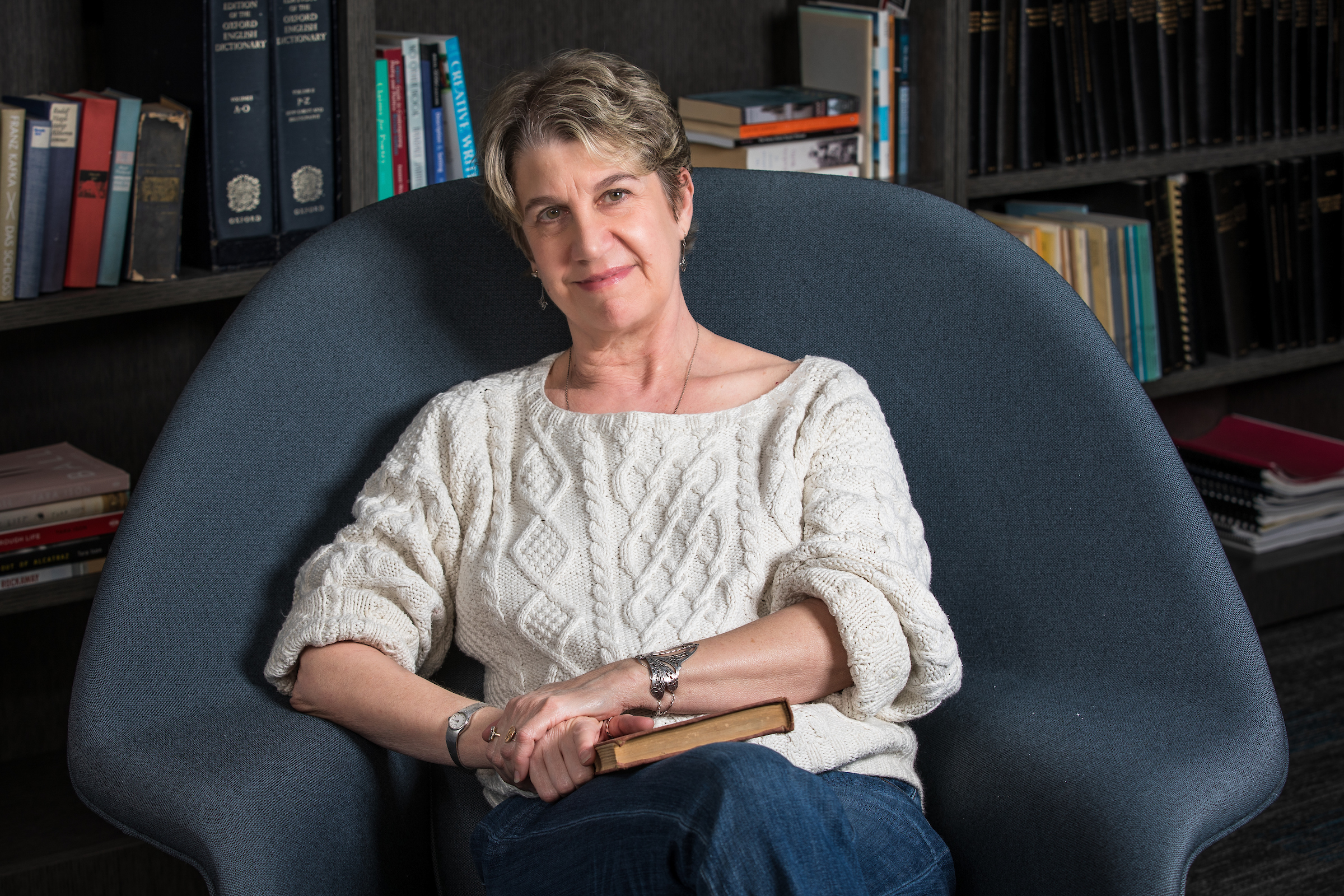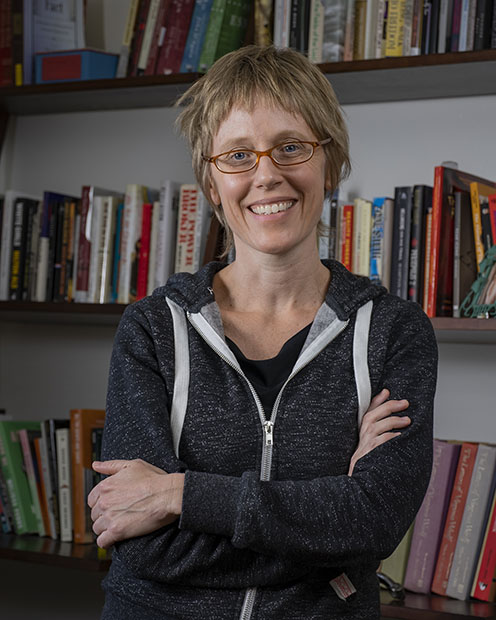Many prominent American writers of the last 50 years — including Alice Walker, Spalding Gray, Maxine Hong Kingston, Louise Erdrich, Tobias Wolff and Sandra Cisneros — have one noticeable career milestone in common: recognition and support from National Endowment for the Arts fellowships early in their careers.
Two ASU writers have just been selected from nearly 1,700 eligible applicants to receive one of these most coveted NEA awards.
On Jan. 16, the NEA announced that Arizona State University professors Tara Ison and Sarah Viren are among 36 writers receiving 2020 Creative Writing Fellowships. These $25,000 fellowships enable the recipients to set aside time for writing, research, travel and general career advancement.
Fellows are selected through a highly competitive, anonymous process and are judged on the artistic excellence of the work sample provided.
“The National Endowment for the Arts is proud to support our nation’s writers, including Tara Ison and Sarah Viren, and the artistry, creativity and dedication that go into their work,” said Mary Anne Carter, chairman of the National Endowment for the Arts.
Fellowships alternate between poetry and prose each year, and this year’s fellowships are to support prose writers.
The full list of FY2020 Creative Writing Fellows is available on the NEA website, as is an archived list of all prior recipients. Since 1967, the Arts Endowment has awarded more than 3,500 Creative Writing Fellowships totaling over $55 million. Many American recipients of the National Book Award, National Book Critics Circle Award and Pulitzer Prize in Poetry and Fiction were once NEA fellows.
ASU Professor of English Tara Ison has received wide acclaim and support for her work, which includes novels, short stories, essays and screenplays. Photo by Charlie Leight/ASU Now
Tara Ison is a professor in the Department of English at ASU, where she teaches fiction writing. The fellowship will enable her time and space to complete her new collection of short stories tentatively titled, "The Meat Bee." The collection’s centerpiece is a 2018 story that Ison published in the literary journal Tin House.
Ison said she was “over the moon” about the award, which is her second such fellowship from the endowment. She described her great respect for the arts agency’s work.
“When Dana Gioia was head of the National Endowment for the Arts, he gave a lecture on the importance of arts funding in public schools,” Ison said, “and how literature, especially, allows us to intimately enter the consciousness of another person, to get into their hearts and soul and mind to understand their experience of the world; this fostering of empathy is essential to the full development of a human being, and a society. I'm very grateful to the NEA for this inspiring mission and for their support.”
Ison is the author of a short story collection “Ball” (2015), and the novels “A Child out of Alcatraz” (1997), “The List” (2007) and “Rockaway” (2013), the latter of which was featured as a “best book of summer” by O, The Oprah Magazine. She is also the author of the PEN Southwest Book Award-winning essay collection, “Reeling Through Life: How I Learned to Live, Love, and Die at the Movies” (2015), a memoir in 10 film-centered essays.
A former Hollywood screenwriter, Ison is the co-writer of the cult movie “Don’t Tell Mom the Babysitter’s Dead” (1991).
She has received wide acclaim and support for her work in addition to the NEA fellowships. Author Rick Moody, who was one of Ison’s graduate school mentors, has referred to her as “a real voice for our times.” Ison has been granted multiple Yaddo fellowships, a fellowship at Hawthornden Castle in Scotland, a Rotary Foundation Scholarship for International Study, a Brandeis National Women’s Committee Award, a Thurber House Fiction Writer-in-Residence Fellowship, the Simon Blattner Fellowship from Northwestern University, and a California Arts Council Artists’ Fellowship Award.
Ison received her MFA in fiction and literature from Bennington College. Before coming to ASU, she taught creative writing at several institutions of higher learning including Washington University in St. Louis and Northwestern University.
ASU Assistant Professor of creative nonfiction Sarah Viren specializes in the study of the literary essay. Photo by Charles Darr
Sarah Viren, assistant professor of creative nonfiction in the College of Integrative Sciences and Arts, is a writer, journalist and literary translator who teaches a range of nonfiction writing courses at ASU’s Downtown Phoenix campus. In January, she also became interim director of the Graduate Certificate in Nonfiction Writing and Publishing, in the School for the Future of Innovation in Society on the ASU Tempe campus, where she teaches the certificate's core course, Masters of Nonfiction.
With the fellowship, Viren will be able to buy time “away from my kids — whom I love but who require a lot — and my job — ditto — so that I can finish a book about a question I’ve been trying to disentangle for 25 years. I’m more than grateful for that opportunity,” she said. “I’m elated.”
The book, she said, is a researched memoir tentatively called “Autobiography of Shadows.”
“It's a very loose retelling of Plato's ‘Allegory of the Cave’ that interweaves interviews and personal experiences as a means of better understanding the current rise in conspiratorial thinking and alternative fact-making,” explained Viren, who as a scholar specializes in the study of the literary essay.
Just a few days before the NEA Prose Fellowships were announced, Viren’s own essay collection, “MINE: Essays,” won the 2020 Great Lakes Colleges Association (GLCA) New Writers Award in Creative Nonfiction.
Among the praise that the GLCA judges shared about Viren’s debut volume of published creative nonfiction were these observations: “Viren's essays are extremely well-crafted, and her prose beautiful. The voice is mature, full of wisdom and insight. A brilliantly rendered account of what it means to be of a place, Viren’s collection also answers what it means to be of the world and what it means, ultimately, to be here today.”
The collection previously won the 2016 River Teeth Literary Nonfiction Prize, was a Silver Winner in the Foreword Reviews INDIES Book of the Year Awards, was named one of LitHub's favorite books of 2018, and was long- or short-listed for other honors.
In 2016, Viren published a translation of the novella “Córdoba Skies,” by the Argentine author Federico Falco, and her co-edited anthology of the essay in the Americas, “The Great American Essay,” will be published by Mad Creek Books in 2021. Her work has also appeared in, or is forthcoming in, the New York Times Magazine, the Oxford American, Texas Monthly, Guernica, the Iowa Review and other magazines.
Viren joined the ASU faculty in fall 2017 after completing an MFA in creative nonfiction at the University of Iowa and a doctorate at Texas Tech University. She began garnering awards for her writing before attending graduate school, working as a journalist in Florida and Texas for six years.
Despite an impressive track record in publishing work that achieves wide recognition, Viren’s description of receiving the news from NEA about the Prose Fellowship reveals the kind of mental armor writers carry internally to shield themselves from the sting of rejection.
“Sometimes the person you least expect to get a fellowship is you,” she reflected. “But then you get a call at 9 a.m. on a Wednesday in November from a D.C. number, and you think, ‘Who would be calling me from D.C.?’ You pick up anyway, and when the person on the other end says she’s from the National Endowment for the Arts, you briefly wonder if she’s calling to personally reject you.
“Writing is a profession of rejections. You keep writing because you believe in what you’re doing, even if it sometimes feels like no one else does. Getting recognized, though, makes that whole self-confidence act a little easier,” she noted. “Having your government recognize you is surreal.”
Visit the NEA’s Literature Fellowships webpage to read excerpts by and features on past Creative Writing Fellows and recipients of Literature Fellowships for translation projects.
More Arts, humanities and education

ASU professor's project helps students learn complex topics
One of Arizona State University’s top professors is using her signature research project to improve how college students learn science, technology, engineering, math and medicine.Micki Chi, who is a…

Award-winning playwright shares her scriptwriting process with ASU students
Actions speak louder than words. That’s why award-winning playwright Y York is workshopping her latest play, "Becoming Awesome," with actors at Arizona State University this week. “I want…

Exceeding great expectations in downtown Mesa
Anyone visiting downtown Mesa over the past couple of years has a lot to rave about: The bevy of restaurants, unique local shops, entertainment venues and inviting spaces that beg for attention from…




